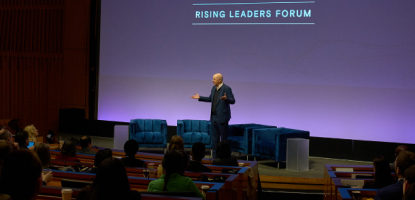Private Wealth Management
Business Capital
The business or corporate pool of capital relates to leadership and business practices that allow a company to financially prosper while also supporting personal and institutional prosperity. A key strategy for leveraging business capital for impact is identifying the operational, cultural and governance mechanisms across a business that support both sustainability and profitability. Today, it is increasingly common to lead a business in line with corporate social responsibility objectives. In 2011, only 20% of S&P 500 companies published sustainability reports, compared to 96% in 2021.1

A company may operate in an impact-related sector such as clean tech or community healthcare, but regardless of industry, it can also create an impact with its employee base and businesses within its value chain. To leverage your business capital, identify how a new investment or process can become a value generator relative to your impact goals.
Consider the following questions to identify ways to leverage your business capital:
- What are the material risks to your business related to climate transition and inclusive growth?
- In what ways do financial successes (i.e., the “top line” of your business) overlap with your impact goal(s)?
- Are there governance and leadership practices in place to support your impact goals, or do you need to build them?
Business Capital - In Action
In 2004, Paul Lindley was profoundly moved by the immensely exciting and emotional experience of having his first child, Ella, and ultimately inspired to challenge the status quo in the packaged baby food business. As a new parent and new entrepreneur, Paul started with a mission, not a financial goal, to improve children’s health by improving their relationship with food via new recipes, packaging, processing and marketing. Ella's Kitchen is now the U.K.'s largest organic baby-food business, with $100 million in annual revenue globally, and a tangible example of how profit and purpose can enhance one another.
In the early years at Ella’s Kitchen, Paul was adamant about building a company culture where all employees joined the organization because they believed in its mission and then stayed motivated because they felt their employer gave them autonomy and support in addition to fair compensation.
After selling the business in 2013, Paul advocated for Ella’s Kitchen to become one of the U.K.’s first certified B-corporations, verified to meet high standards of social and environmental performance, transparency and accountability. With his daughter’s name on every product, supporting this responsible business legacy was paramount for Paul, even without stake in the company. Ella’s Kitchen remains one of the Sunday Times’ best companies to work for, and it most recently announced that over 70% of all packaging will be curbside recyclable by the end of 2024.
Paul has taken the momentum he generated for purpose-led business at Ella’s Kitchen to become an author, community advocate, board member and trustee for numerous nonprofits. He is also a co-founder of just IMAGINE, a global competition in which social entrepreneurs address global challenges through new business ventures.
Key Takeaway: Strong corporate values can reach the bottom line through loyal customers and employees.

Business Capital - In Action
Stephanie Morimoto, owner and CEO of health and wellness brand Asutra, took her personal experience with self-care and passion for diversity and inclusion as an Asian-American woman and infused those values into how Asutra operates and grows. Armed with both corporate and non-profit experience, Stephanie bought Asutra in 2018 and relocated it to Chicago with the hopes of expanding distribution while transforming it into a mission-driven business. Today, Asutra has grown into a nationally recognized brand by providing natural remedies for sleep, pain, mood, stress and women’s health. Asutra promotes the idea that by taking care of yourself, you are more equipped to take care of the community and environment around you.
One of Stephanie’s early goals for Asutra was to offer quality jobs to all members of her Chicago community. Because of the living wages and company-wide retirement benefits Asutra provides, every employee can invest in their own financial stability, exemplified by two of Asutra’s warehouse employees saving enough to buy their first homes in the last year. In addition, Stephanie has built a team that is 60% people of color. . From her very first employee, Stephanie prioritized a diverse candidate pool and has partnered with local job training and placement non-profits to source talent.
Paramount to Asutra’s success has been Stephanie’s commitment to building a company culture based on core values. Even in interviews, the Asutra team refers directly to their core values statement to craft questions to understand a prospective employee’s fit. This has allowed Stephanie to build a team that is compassionate and accepting of differences while also being single-minded in their pursuit of Asutra’s success. At Asutra, Stephanie set an unwavering foundation for a business that prioritizes the wellbeing of both its customers and its employees.
Key Takeaway: Sharing personal goals and ambitions can be a highly effective way to lead and motivate a corporate team.

Explore Business Capital Related Insights
Last Revised: August 2024
[1] 2022 Sustainability Reporting in Focus Research Report, Governance & Accountability Institute, Inc.
This material is intended for educational purposes only and is provided solely on the basis that it will not constitute investment advice and will not form a primary basis for any personal or plan’s investment decisions. While it is based on information believed to be reliable, no warranty is given as to its accuracy or completeness and it should not be relied upon as such. Goldman Sachs is not a fiduciary with respect to any person or plan by reason of providing the material herein, information and opinions expressed by individuals other than Goldman Sachs employees do not necessarily reflect the view of Goldman Sachs. This material may not, without Goldman Sachs’ prior written consent, be (i) copied, photocopied or duplicated in any form, by any means, or (ii) distributed to any person that is not an employee, officer, director, or authorized agent of the recipient. This material is not an offer or solicitation with respect to the purchase or sale of any security in any jurisdiction. Investing involves risk, including the potential loss of money invested. Past performance does not guarantee future results. Neither asset diversification or investment in a continuous or periodic investment plan guarantees a profit or protects against a loss. Information and opinions provided herein are as of the date of this material only and are subject to change without notice.
© 2024 Goldman Sachs. All rights reserved.
Goldman Sachs & Co. LLC is registered with the Securities and Exchange Commission (“SEC”) as both a broker-dealer and an investment adviser and is a member of the Financial Industry Regulatory Authority (“FINRA”) and the Securities Investor Protection Corporation (“SIPC”).
© 2025 Goldman Sachs. All rights reserved.

